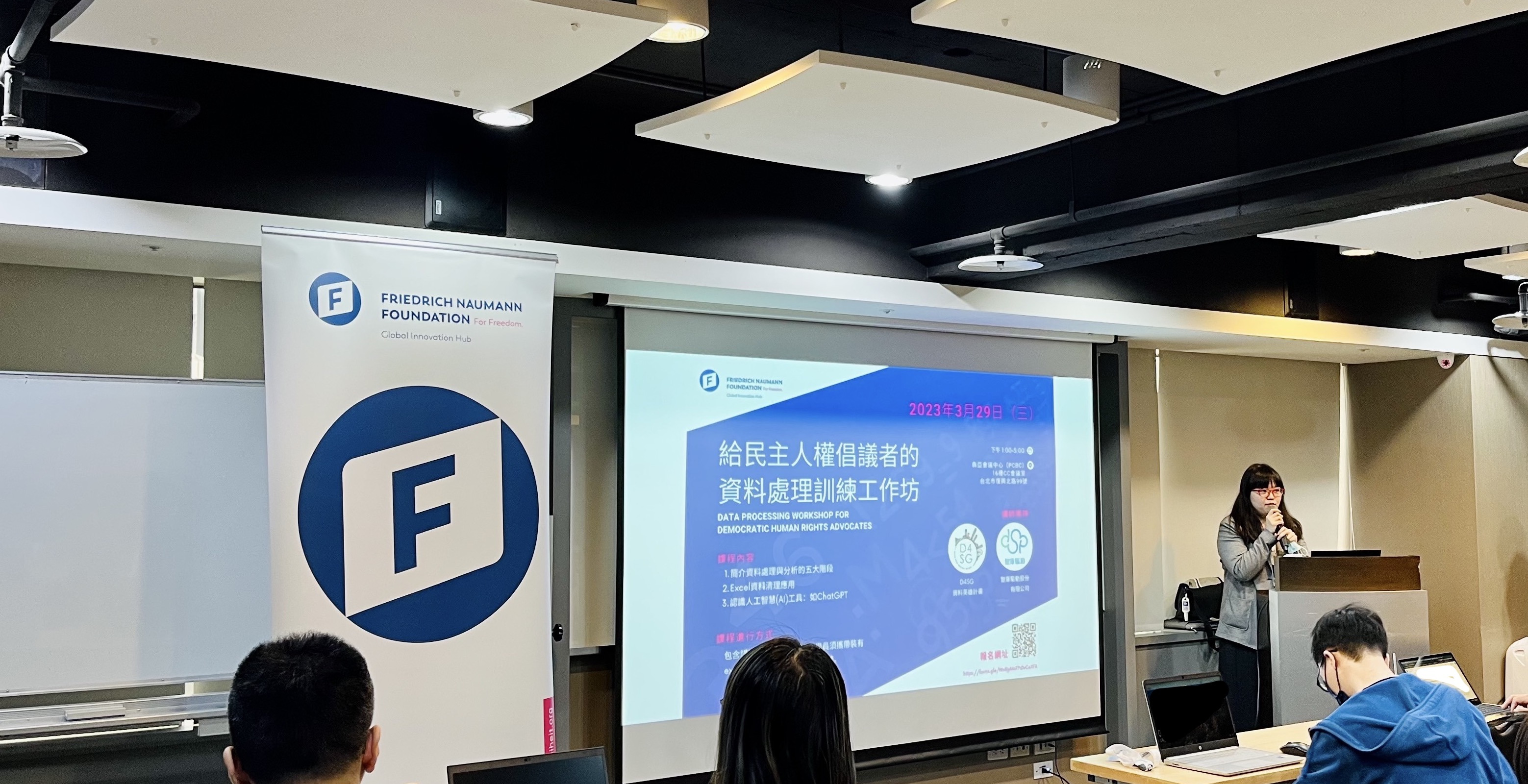Innovation for Democracy
Data Processing Guide for Democracy and Human Rights Advocates

Ya-wei Chou, FNF Global Innovation Hub's Program Manager, welcomes the workshop participants
© FNF Global Innovation HubThe FNF Global Innovation Hub held the Data Processing Training for Democracy and Human Rights Advocates in Taipei on March 29, and published a guide to offer democracy and human rights advocates a roadmap on how to process data and thereby turning data into a useful resource for advocacy.The workshop and guide aim to provide advocates a systematic framework of data processing, training on using data processing software, and knowledge on how to properly use AI tools for data processing.
How Does Data Science and Advocacy Go Together?
Processing data is a must-do for almost every organization.There are some things, that all offices and all share across the board: The daily “joys” of admin tasks and Excel files: NGO staff and democracy advocates need to know how to quickly process and track donor and supporter data, create repositories of questionnaires to survey people's attitudes about an issue, and gather information from the Internet to use evidence to support their advocacy.
Data is also an important basis and source for inspiring more innovations for democracy. For example, our Innovation for Democracy Cafe has showcased how civic tech communities and NGOs for environmental protection create digital platforms and tools to monitor pollutions by using data that was collected through the collaboration between the public, civic tech communities, and NGOs. Without source of data and the knowledge to properly process it, advocates will lose opportunities for innovations.
Obviously, training of data science is necessary since it supports democracy advocates for sustaining their daily organizational works and innovating advocacy approaches, and it motivated us to host this workshop and produce the guide to offer knowledge and training to help advocates to process data.
Moreover, based on the feedback from participants, we believe that there is a strong need for training in computing, AI, and all kinds of technology for advocates of democracy, human rights, and freedom. Although the feedback came only from our participants in Taiwan, we believe that advocates all over the world need more tools not only for their daily work, but also to effectively counter the rising authoritarian forces that are often projected through strong technology capabilities.
Learning about Data Science, Guide for Data Processing, and Software Skills
For this training, we enlisted the help of DSP-Data for Social Good team. The Team provided training through both lecture and step-by-step practical exercises. They started off by introducing basic steps of how the participants should handle data. This helped the participants to establish a basic framework of data processing in their minds, which is helpful for when they have to process large amounts of data. The framework is summarized as the guide for democracy advocates on data processing below. You can use it as a roadmap to guide you to find the exit of the maze of data and to self-check what step is missing:

FNF made this guide in collaboration with the DSP-Data for Social Good team.
© FNF Global Innovation Hub-
Download the Spanish Guide
-
Download the English Guide
-
Download the Chinese Guide
The next item on the agenda was learning how to quickly cleanse and summarize data by using programmes like Excel. In the second segment, we took a closer look at ChatGPT and how to use AI tools as such to quickly process data. The trainers showed how to prompt ChatGPT to generate source code to automatically redo macros on many Excel spreadsheets, giving attendees more tips and tools to process massive amounts of data in a short amount of time.
AI tools are powerful and helpful tools. While there is no need to be scared, it is important to be aware of risks and dangers, such as privacy and copyright issues. The trainers emphasized that we should only use AI tools as a reference rather than taking the answers they provide as 100% correct.
Feedback from Participants and Our Expectation
The Hub team was encouraged to see that all registered participants actually attended the training, and most of the participants gave us very positive feedback. According to our post-event questionnaires, most of the participants felt that they became more confident in handling large amounts of data and gained more understanding of ChatGPT by giving full marks in their self-evaluation after the workshop.
As liberals, we are not afraid of new technology. We are aware that there are risks, but we believe that technological advance can ultimately help us to master challenges. By learning from the feedback from participants and advocates around the world, we will continuously explore knowledge on technologies that will help democracy advocates to facilitate their works on advocacy.
